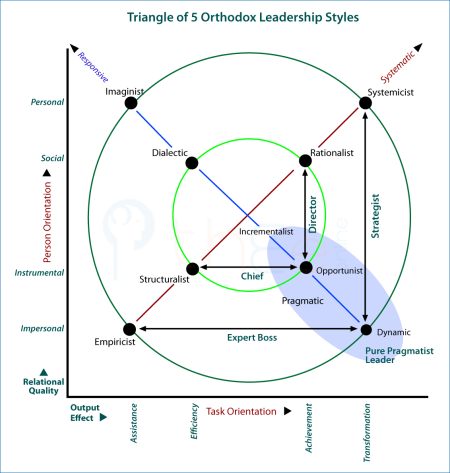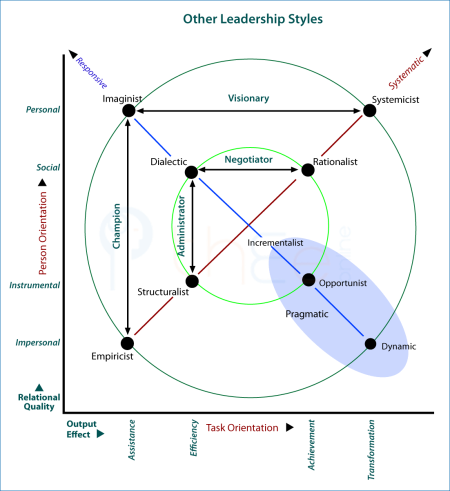Implications for Leadership Style
«Leader» refers to a person who can and does organize and influence a group of people (known as «followers» or «the led») to achieve a result desired by the leader and the group. «Leadership» refers to that process.
The 5 Orthodox Forms of Leadership Style
To lead in a firm or typical organization, it is essential that a person is able to make things happen and is seen by all not just as a doer but as an achiever. The is an achiever who operates by doing in a dynamic take-no-prisoners way. For staff around them, it becomes a case of follow or else.
 What pragmatic leaders need…
What pragmatic leaders need…
All standard leadership styles—viewed from the perspective of decision-making—must provide for rapid execution (i.e. doing) and so must include the responsive .
Excluding combinations in the upper left of the TET, there are 4 other leadership possibilities, one for each approach on the comprehensive-systematic diagonal.

Working our way upwards now….
 Empiricists can be dynamic leaders.
Empiricists can be dynamic leaders.
It seems appropriate to name this type: the «Expert-Boss».
 Structuralists can become authoritative leaders.
Structuralists can become authoritative leaders.
The label «Chief» fits this mix of order, routine, control and swift, effective action.
 Rationalists often gravitate to leadership positions.
Rationalists often gravitate to leadership positions.
Given the unmistakable urge to control associated with efforts for consensus, a suitable label would be «Director».
 Systemicists with executive drive can become extraordinary leaders.
Systemicists with executive drive can become extraordinary leaders.
The label «Strategist» fits someone who can devise an unexpected strategy to produce a well-judged outcome with a minimum of effort.
REMEMBER: There is far more to leadership than decision-making.
Four Social Styles of Leadership
We must now turn to the other triangle of combinations, which reveals important possibilities for leading groups to beneficial outcomes.

In certain situations and in bodies like advocacy organizations, public services, government bureaucracies, labour unions, membership associations and academic institutions, leadership is more about communicating effectively and maintaining group integrity than dynamizing group action to get results.
So a different form of leadership to that desirable in conventional firms emerges. These leadership styles use combinations in the upper left triangle.
 Empiricists can evangelize with the facts.
Empiricists can evangelize with the facts.
«Champion» is a common label for those who can carry people with the infection of their enthusiasm and their depth of knowledge.
 Structuralists can lead politically controlled agencies.
Structuralists can lead politically controlled agencies.
The label «Administrative Leader» seems appropriate for those in charge of bureaucracies and regulatory authorities.
 Rationalists can lead bodies seeking to impact in public arenas.
Rationalists can lead bodies seeking to impact in public arenas.
The label of «Negotiator» may capture the leadership role that is essential in certain types of politically active organizations.
 Systemicists can be effective leaders in futuristic or challenging circumstances.
Systemicists can be effective leaders in futuristic or challenging circumstances.
The label of «Visionary» fits individuals who make a social impact through the power of their imagination, determination and grasp of reality.
REMEMBER: There is far more to leadership than decision-making.
- See some more down-to-earth examples of TET-based comparisons of decision-makers.
- Continue to strengthening the management culture.
Originally posted: 21-Apr-20Some 11